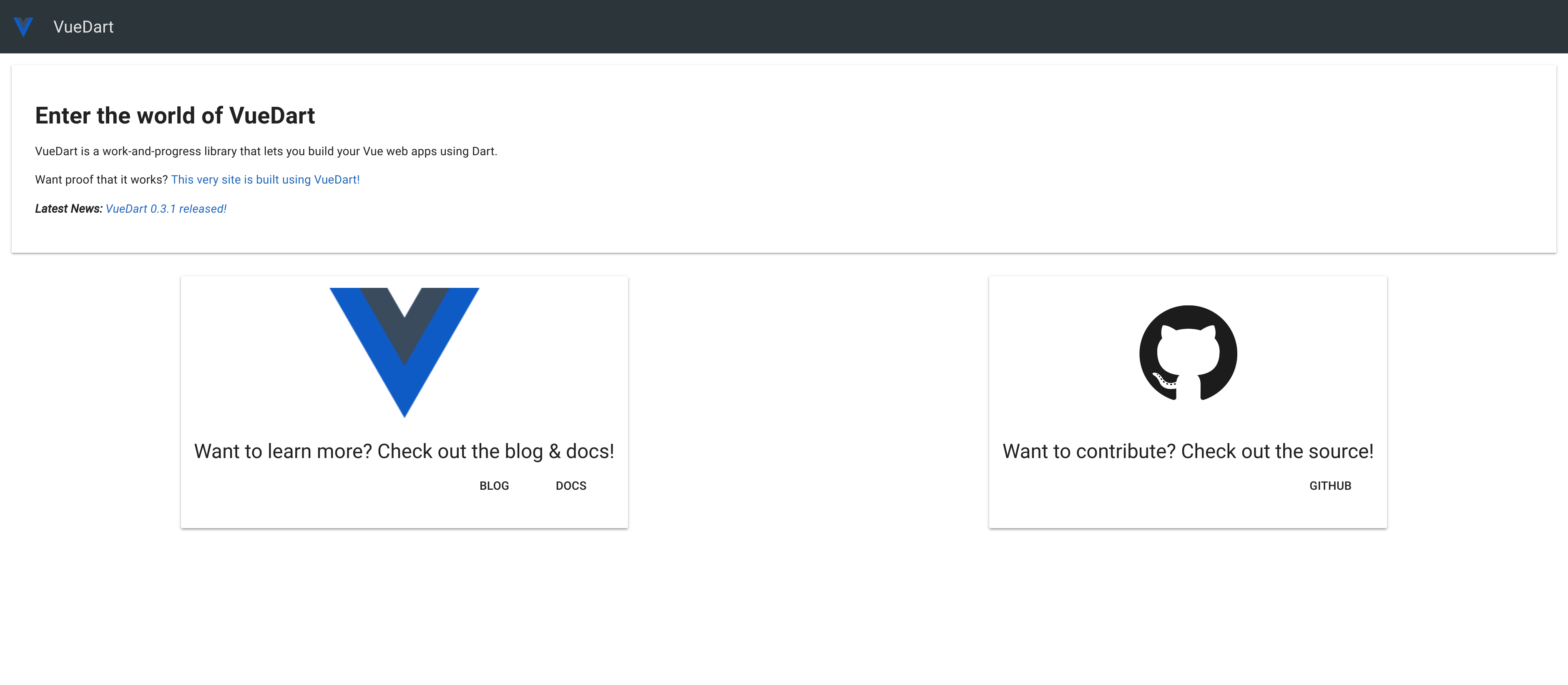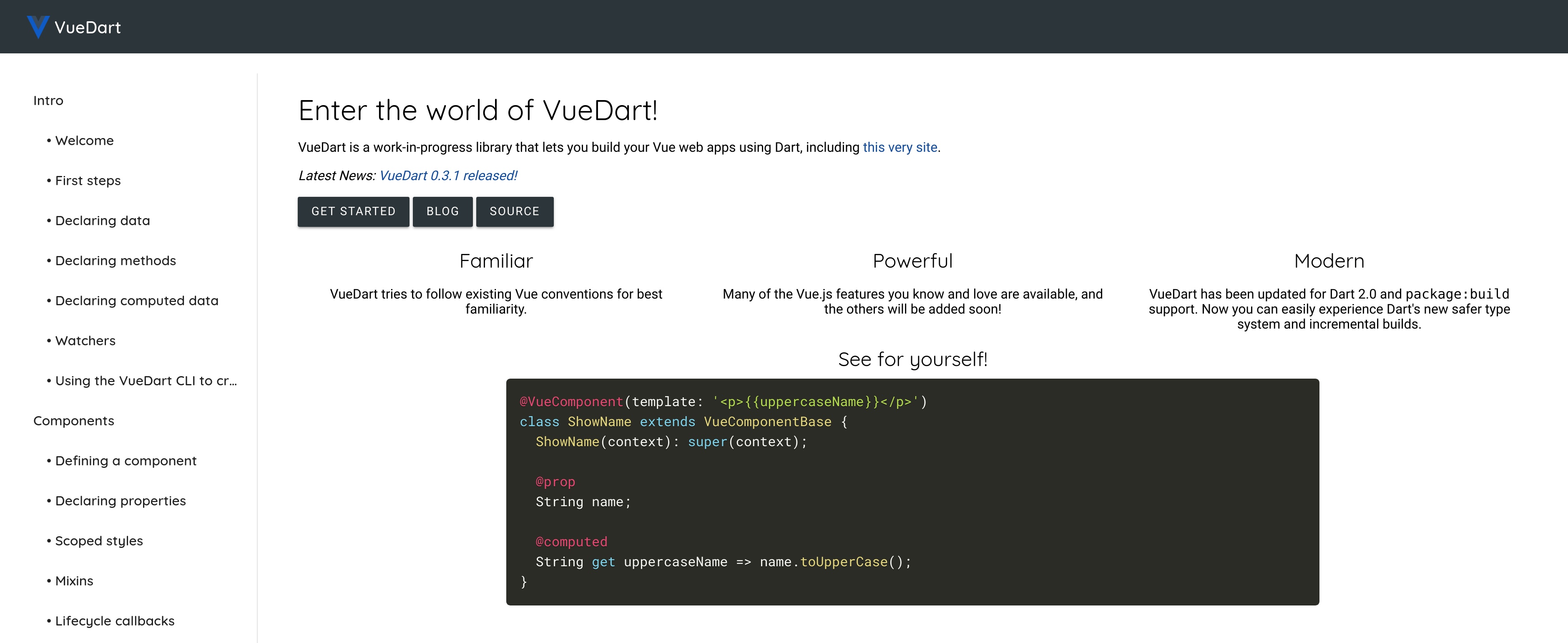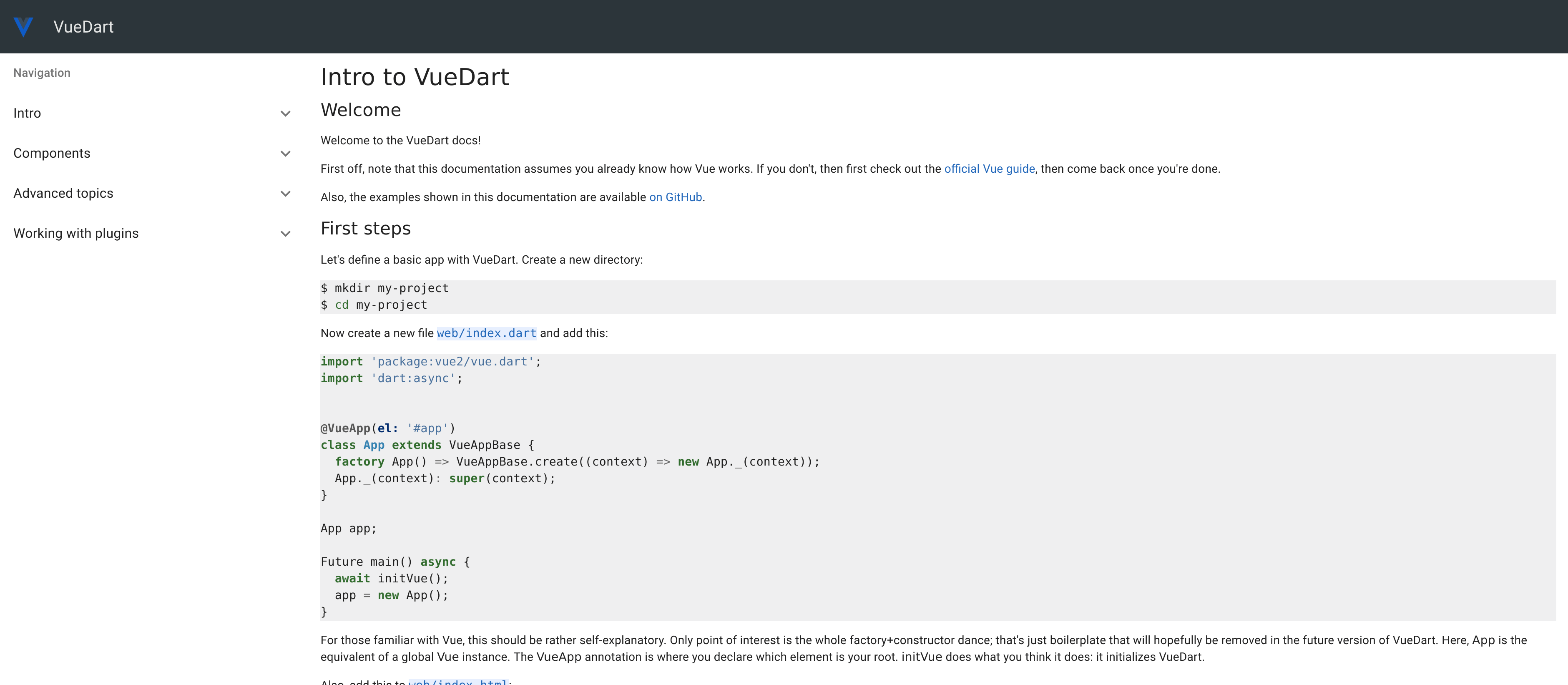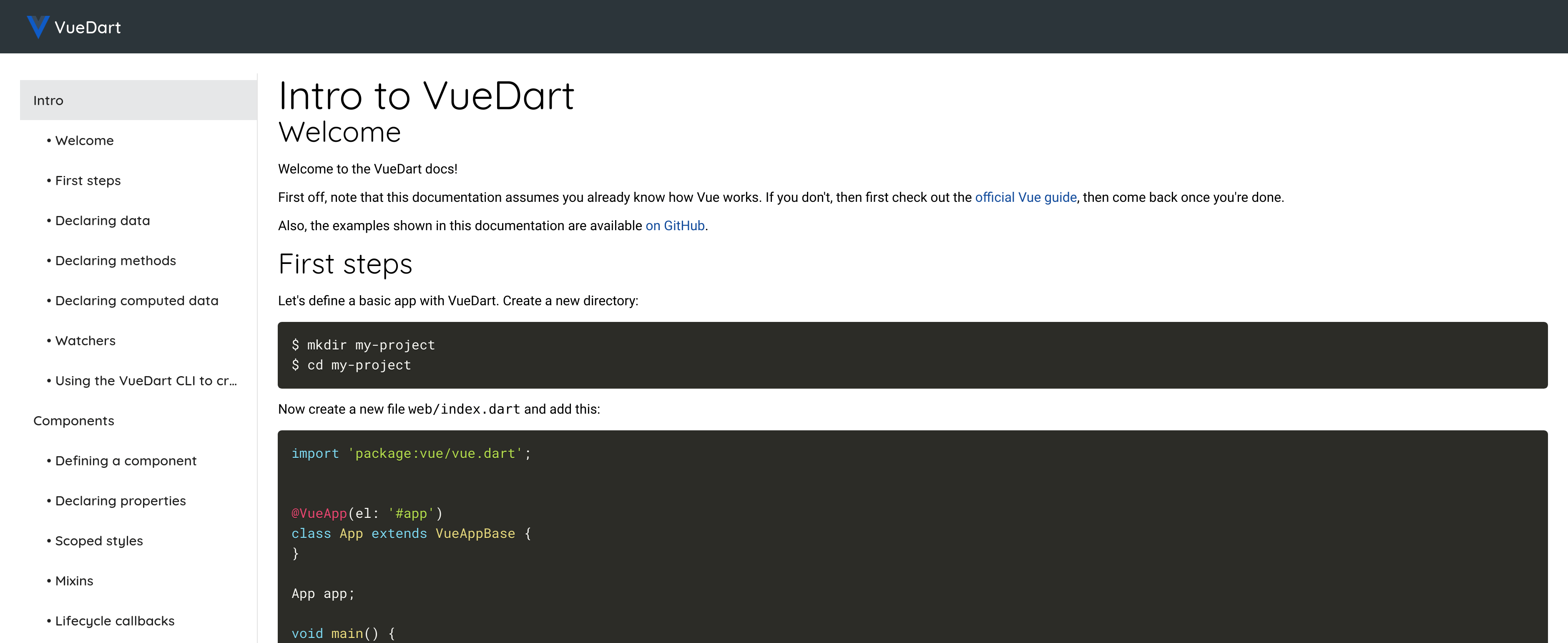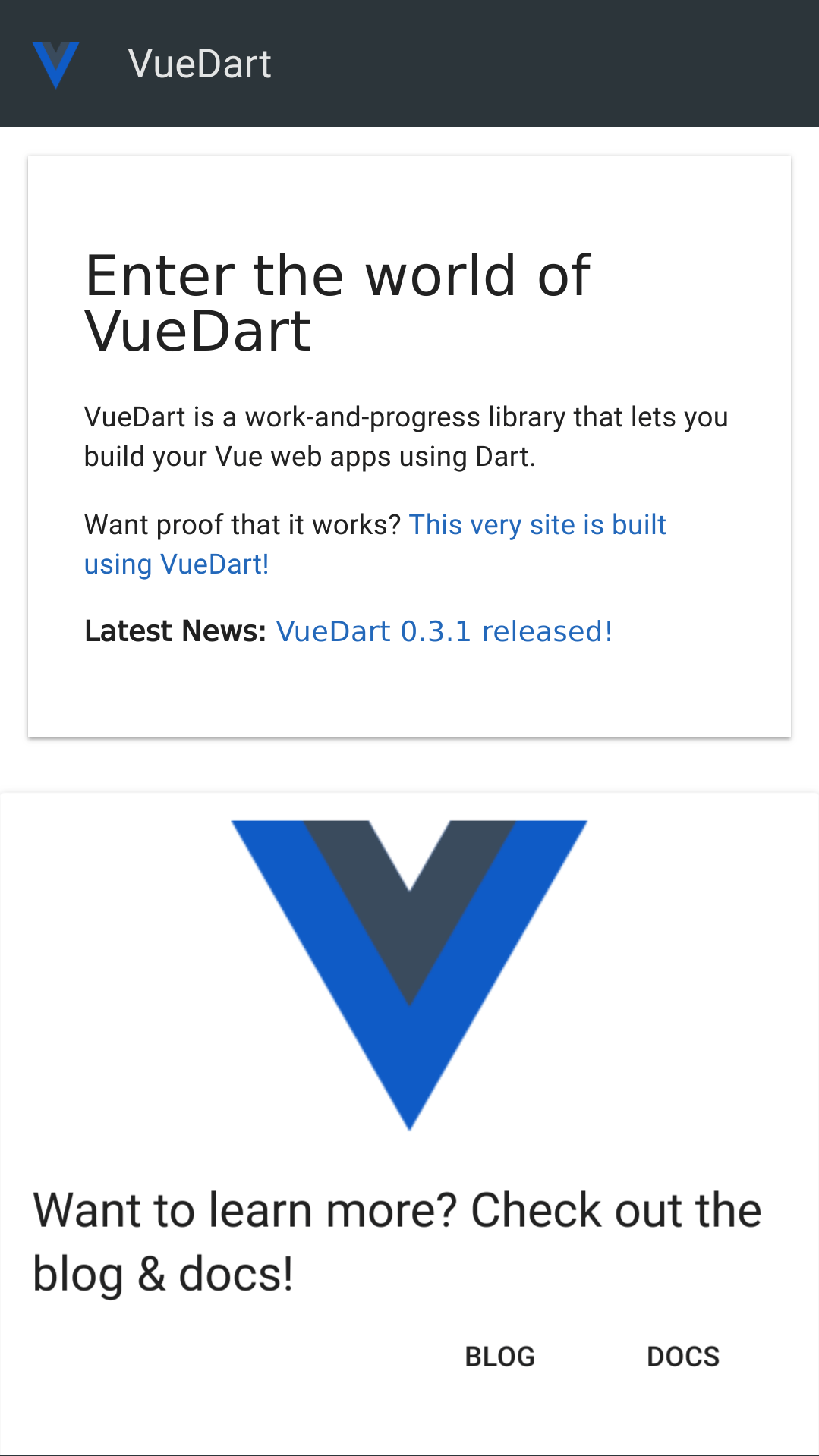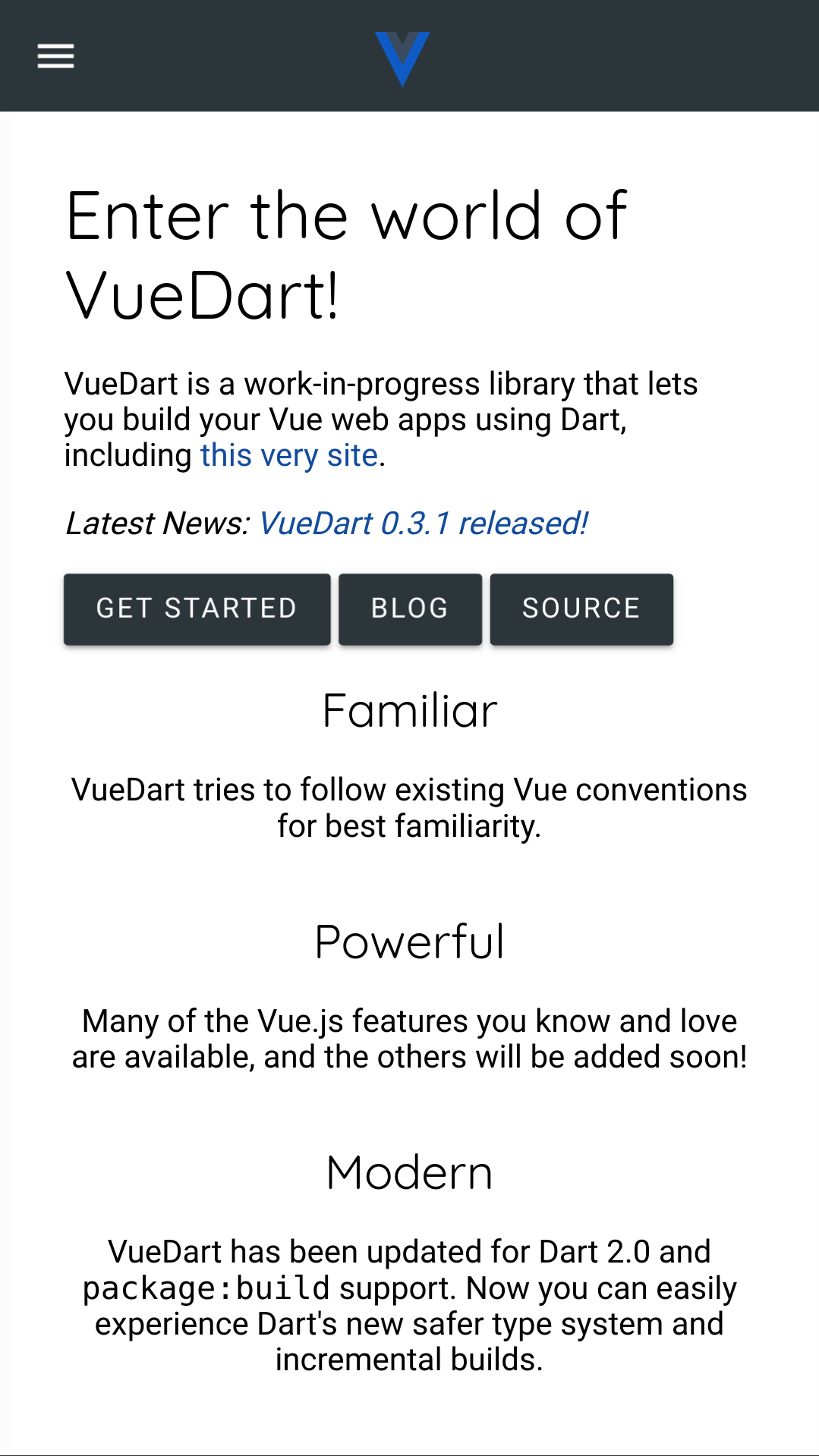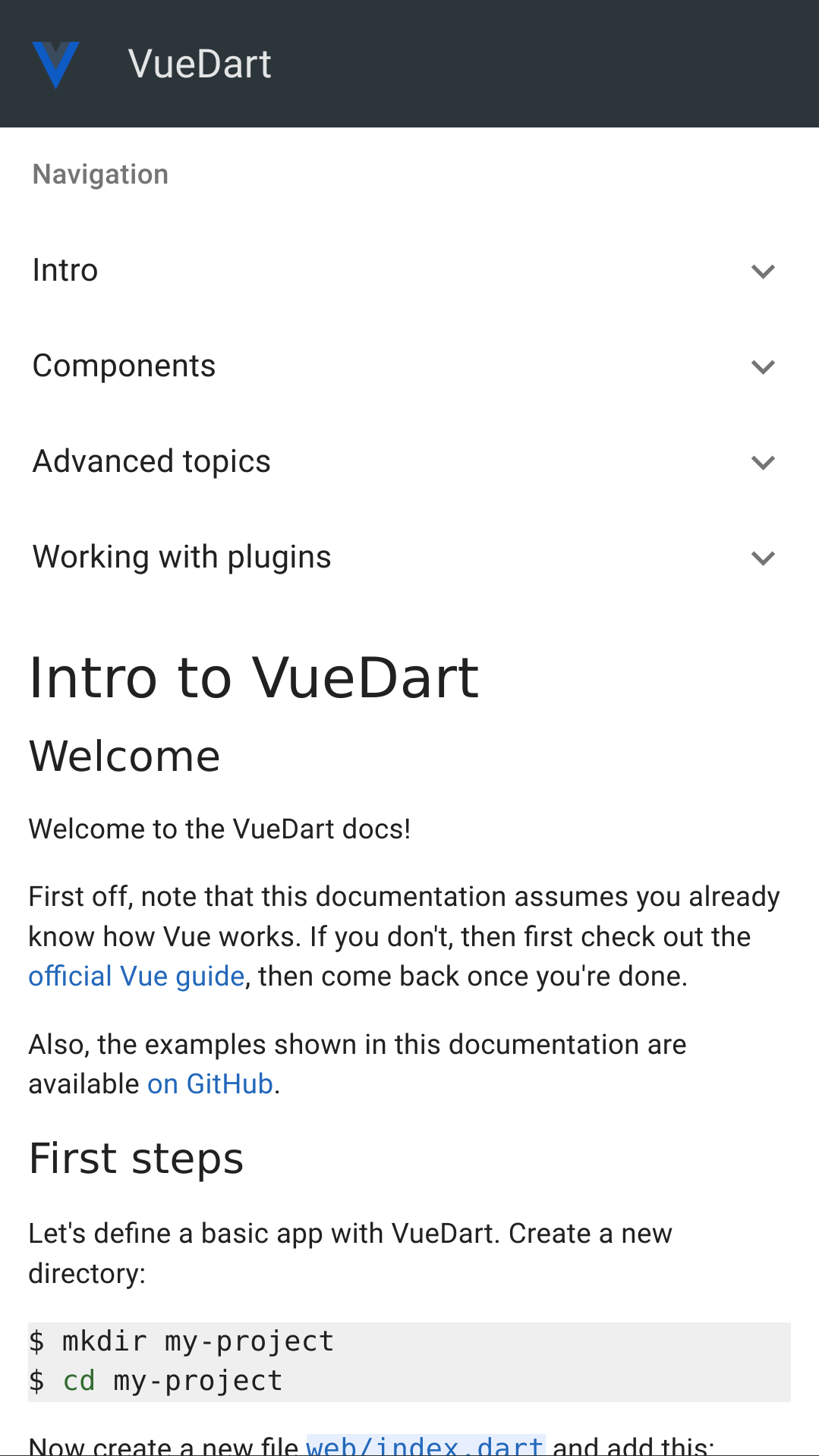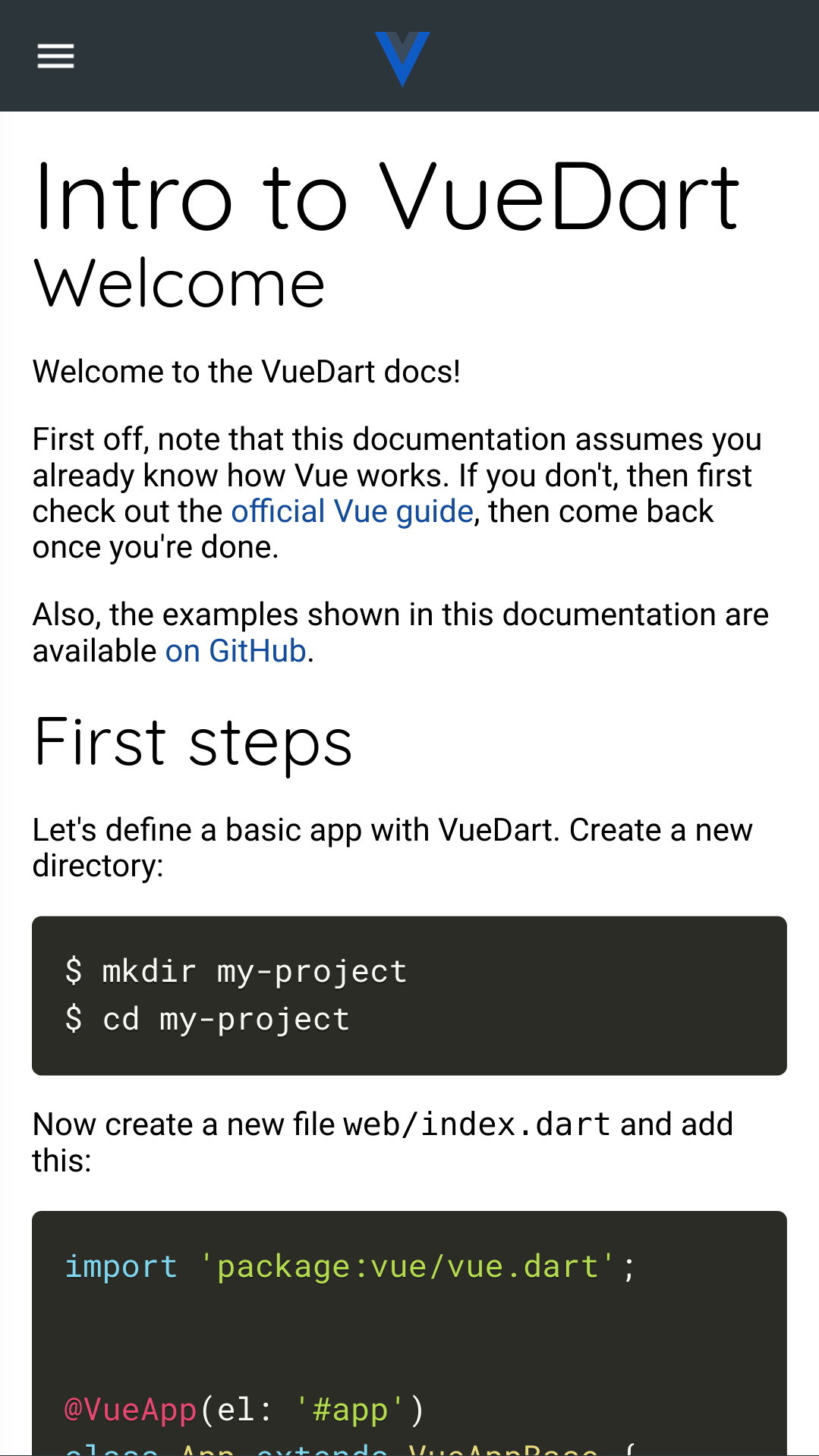VueDart 0.4 released!
Website redesign
First off, since cosmetics are obviously the most important part of a web framework (/s): the website has undergone a complete redesign, built on top of vdmc and VueDart 0.4.
Here's some pictures for comparison (they're in pairs: first comes the old, then the new design):
Major changes
Dart 2 support
VueDart 0.4 comes with first-class Dart 2 support. pub is no longer supported, and everything has been moved over to package:build . This caused some major changes in the way VueDart transforms code, which led to several other changes that will be mentioned below.
That being said, the immediate change is that you'll no longer be using pub to build and serve your projects. Instead, webdev is taking its place.
vue2 is now vue
The package names vue2 and vue2_cli are now just vue and vue_cli , respectively. Huge thanks to @emilniklas for letting me use it !
Mixins
Mixins have undergone two major changes.
First up: all mixins must now have implements VueMixinRequirements :
@VueMixin()
class MyMixin implements VueMixinRequirements {
// ...
}The other change is that there is no longer a mixins: argument to VueComponent:
// Before
@VueComponent(
// ...
mixins: const [MyMixin],
)
// Notice the mixins are given twice: the mixins: argument above only takes VueDart mixins
class MyComponent extends VueComponentBase with MyMixin
Of course, the problem was you could forget to put the mixin in both places properly. Now, you just need to put it inside the with clause and drop the mixins: argument.
As one other bonus, mixins can now be passed to VueApp , not just VueComponent .
Components are no longer globally registered
Before, component registration was a bit like this:
@VueComponent('my-component', template: '<<')Now, it's like this:
@VueComponent(template: '<<')Wait, what? Where did the component name go?
In VueDart 0.4, no components are globally registered. Instead, they must be passed to the components/apps using them, just like in vanilla Vue. For example:
@VueComponent(template: 'stuff here')
class MyComponent extends VueComponentBase {
}
@VueComponent(template: '<my-component/>',
// Have to pass MyComponent to say it's being used
components: [MyComponent])
class MyOtherComponent extends VueComponentBase {
}
@VueApp(id: '#app', components: [MyOtherComponent])
class App {
}The primary benefit is better tree-shaking.
If you have a lot of components that you frequently use, you can put them all in a mixin:
@VueMixin(components: [MyComponent, MyOtherComponent])
class MyMixin implements VueMixinRequirements {}
@VueComponent(template: '<my-component>')
class MyThirdComponent extends VueComponentBase with MyMixin {}As a side note, one nice new feature of Dart 2 is that you no longer need to prefix the type lists with const like you did for the old mixins.
No more constructor boilerplate
You may noticed something interesting about the above examples: the constructor boilerplate from before ( Component(context): super(context) and the whole factory dance) are now completely gone! However, as a side-effect of this, you can no longer use the constructor as the created . Instead, a proper method override has been added .
Lifecycle hook renaming
All the overridable lifecycle methods now are prefixed with lifecycle :
// Before
@override
void mounted() {}
// Now
@override
void lifecycleMounted() {}In addition, as mentioned above, there's now a lifecycleCreated hook.
Type-safe event API
The primary way of handling events in Vue is via v-event:event="handler" (or @event="handler" ). However, it offers another method, via $emit , $on , $off , and $once .
If this seems familiar, it's because this is basically a JavaScript/Vue version of Dart's streams. VueDart now has a type-safe API for interacting with events that utilizes these streams! Here's an example:
@VueComponent(template: '<button @click="_clicked">Button</button>')
class MyButton {
// The event spec.
static final buttonClicked = VueEventSpec<int>('button-clicked');
// The sink is used to emit events, and the stream is used to receive them.
VueEventSink<int> buttonClickedSink;
VueEventStream<int> buttonClickedStream;
@override
void lifecycleCreated() {
buttonClickedSink = buttonClicked.createSink(this);
buttonClickedStream = buttonClickedStream.createStream(this);
}
@method
void _clicked() => buttonClickedSink.add(DateTime.now().millisecondsSinceEpoch);
}
@VueComponent(template: '<my-button ref="button"></my-button>',
components: [MyButton])
class MyOtherButton {
@ref
MyButton button;
@override
void lifecycleMounted() {
// Receive events
button.buttonClickedStream.listen((time) {
print('Clicked at $time');
});
}
}Sass support
You can now use Sass inside your component styles:
<template vuedart>
<!-- ... -->
</template>
<style scoped lang="sass">
p {
background-color: purple;
:hover {
background-color: blue;
}
}
<style>
Model support
Models are now supported via @model() :
@model(event: 'my-event')
@prop
int someProp = 0;Bugfixes
bool props work properly
Before, if you created a bool prop, it would end up being assigned the empty string instead of true and null instead of false. This now works properly.
Methods can take optional arguments
This "worked" under Dart 1.0, but it was actually never supposed to. VueDart 0.4 now implements this properly.
Plugin-related work
VueRouter changes and VueAppOptions
When you pass components to VueRouter, you must now use ComponentName() instead of #ComponentName .
In addition, a new API for passing miscellaneous options to the Vue JavaScript constructor has been added, called VueAppOptions . VueRouter has been adapted to use this new API: instead of the previous way of passing the router to your app, pass it via app.create(options: [router]) .
VueMaterial is now considered legacy
The built-in VueMaterial support has been moved to package:vue/plugins/vuematerial_legacy . It was never past VueMaterial 0.8, and future work in Material Design support is going towards Vdmc .
CLI work
Version numbers now align with VueDart
The versioning system now matches the corresponding VueDart version. For instance, vue_cli 0.4 will generate VueDart 0.4 projects.
The migrate command is now unsupported
It was a cool idea that never actually worked that well and could wreck stuff easily. It's still there, but you probably shouldn't be using it.
What’s next?
Unfortunately, due to the...chaos that went into this release (fun fact: wiping out your home partition is not fun), there were some things that didn't quite make it in, or aren't polished to the extent that I want. This will likely come to the next VueDart version, most likely 0.5 (though the Aspen parts may come to a 0.4.1, if it were to be released).
Aspen rework
Aspen still has to be run manually via the command line. This sort of made sense when pub was a build system, but now with package:build , as well as the new focus on vdmc, it's a disaster . Therefore, the goal is to rework Aspen to be a builder. In addition, it may will generate Dart code rather than direct JavaScript.
The main benefit will come from being able to use generated outputs as assets. In addition, you won't have to worry about forgetting to run it! It'll also be more easily used by vdmc. Speaking of vdmc...
VueDart Material Components
Vdmc is an early WIP set of wrappers over Material Components Vue , which is in turn a set of wrappers over Material Components for Web . This basically means that, soon, VueDart will have a full set of wrappers over the official Material Design components! I was hoping this would be ready for prime time by now, but more work needs to be done. In particular, I want it to properly use the new, coming-soon Aspen for assets and have actual documentation.
That being said, you can already see how it looks via the VueDart website redesign .
Compiling component templates
This is my personal main target for 0.5. Right now, component template HTML is inserted directly into the code and compiled at runtime. I want 0.5 to have a template compiler like normal Vue does, which would actually compile the HTML templates into Dart render functions (though better render function support is probably going to come in the pipeline first).
Vuex
Yes, this got delayed again. It will come...eventually...
